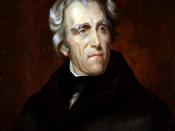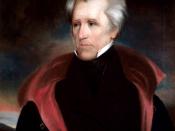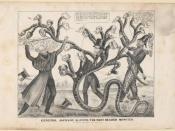Andrew Jackson, the seventh president of the United States of America, is one of the most remarkable and memorable political figures in American history. Born on March 15, 1767, on Waxhaw in the border of North and South Carolina, he matured to become a man with an imposing personality and equally noticeable presence. His two presidential terms (1828-1836) are noteworthy for his strong leadership and definitive involvement in the young country's many issues (the economy, sectionalism, government, etc...). Nevertheless, Jackson's economic, political, and social policies are what made him famous or infamous to the American public.
Economically, America in the 1800s was sectionalized (the South was agrarian, the North was industrial, and the West was developing). This made the creation of a unified economical plan a difficult task. The Tariff of Abominations was an economical issue that Jackson had to deal with firsthand. Tariffs were passed to protect the American industry from foreign competition; however, it drove prices up for all Americans.
The Tariff of Abominations, passed in 1828, protected the industrialized North's products, but outraged the South. They believed that they were at a disadvantage since they were heavy consumers of the products from the North, and their own products (cotton and other crops) were not protected. Nullifiers (individuals against the tariff who wanted it to be nullified) threatened to separate South Carolina from the Union if their demands were not met. Jackson responded to their demand by sending military and naval enforcements to the state. Henry Clay, in order to prevent civil war, passed the Tariff of 1833 that would significantly lower tariffs over the years. Also, the Force Bill (it allowed the president to use the militia to collect tariffs, if necessary) was passed by Congress. Aside from tariffs, Jackson distrusted the Bank of the...


